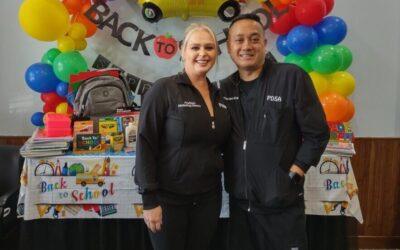Applying to a job or an internship can be daunting, beginning with polishing a CV, cultivating your online presence, not to mention combing through job listings to see what fits your interests and skills.
Give Back is helping its scholars get launched on their career paths by connecting them to professionals who can help talk them through the process and look at their application materials. Before you sign up for an individualized consultation, be sure to check out the resources below on how to get your CV and cover letter in shape!
Cover Letters
A cover letter is a document sent to hiring managers to provide additional information on your motivations, experience, and skills. We suggest using one of the two main types of cover letters: letters of application for specific open positions or letters of inquiry to ask about vacancies within an organization or business. Regardless of the kind of cover letter you use, keep in mind that a good letter helps employers learn why you are qualified for the job you are applying for and why you would bring special passion to the role. As our partner, Mercy College, notes, a cover letter should also clarify any doubts they might have after reviewing your resume.
Writing a cover letter for each job or internship can be burdensome. But a well-written cover letter can make you stand out from other candidates. If you’re unsure where to start, learn the cover letter basics. Before you write your first drafts, review the best practices and the do’s and don’ts. For example, you should investigate the organization’s mission and goals and evaluate your skills relevant to the employer’s needs. If you’re looking for some guidance on formatting, make sure your letter has all the essential parts. Our partner Queens College suggests reviewing templates.
Resumes
A resume is the most essential job-hunting document to market you to a potential employer. It helps highlight your professional experiences, accomplishments, and skills relevant to the position. We suggest using one of the three main types of resumes: chronological, functional, or combination. A chronological resume is the most common and organizes information within each category beginning with your most recent job or accomplishment. Whereas a functional resume focuses on your skills, qualifications, and accomplishments rather than dates, a combination resume combines the chronological and functional resume types. Try to utilize the resume type that best suits you and your skills—it is essential to put your best foot forward so as to secure a follow-up interview.
If you are struggling to get your resume started, Mercy College suggests organizing your information using sections. Try to emphasize aspects of your background that are the most relevant to the position(s) you seek. Binghamton University recommends using bullet points! Each bullet point should answer one of more of the following: ‘Who? What? When? Why? How? How many? How often? Results?’. As with cover letters, before you write your first drafts, review the do’s and don’ts or examples to get ideas on how to organize the essential information about you.
Social Media
Social media is a ubiquitous part of everyday life—but it also matters as part of your professional profile. Before you send out your first job or internship application, look at your social media accounts. Are there any posts that portray you in a negative light? Are there posts you would be embarrassed for an employer to see? If it is embarrassing for you, it is likely also embarrassing to your employer and team. Remember that hiring managers and colleges may search for you on social media to determine your candidate eligibility. You also want to emphasize your professionalism in your personal branding. You can do this by creating great professional accounts on LinkedIn and Twitter, which connect you with others and show off your industry expertise. If you’re unsure about your LinkedIn profile, check out this checklist that provides insights on how your photo, headline, summary, and experience sections should look. Rather than seeing social media as recreation alone, use social media as a professional tool. A polished and thoughtful social media profile may catch a recruiting hiring manager’s attention.
Before networking with professionals in the field, evaluate potential jobs you are interested in and look at each position’s responsibilities. Launching your career may seem insurmountable at first, but with the right preparation, you’ll be prepared to take the first step!
Ready to schedule a one-on-one consultation with a professional? Get started.





